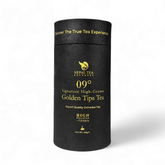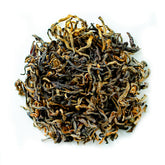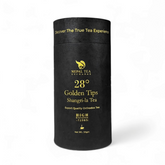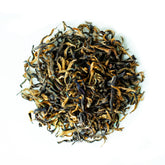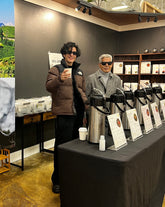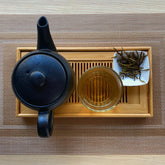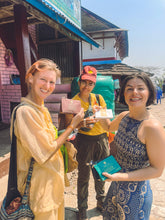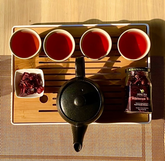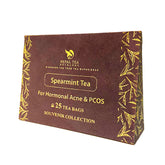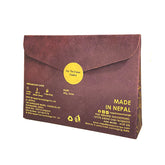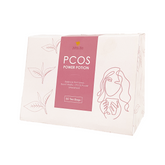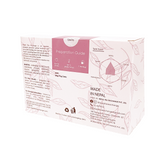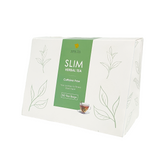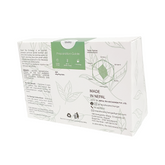The Nepal Tea Signature: Worlds Best Teas

Within the verdant tapestry of Nepal's majestic landscapes, where nature whispers stories as profound as the history they are steeped in, our very own region of Sakhejung in Ilam stands out. Home to the acclaimed Kanchenjungha Organic Orthodox Tea Industries Pvt. Ltd., this area is a sanctum where the artistry of tea-making pulses vibrantly.
The Himalayan Enigma: Elevating Nepal Tea Beyond Darjeeling's Renowned Brews
For generations, the narrative of Himalayan teas has largely been dominated by Darjeeling's renowned offerings. Yet, here in the high-altitude embrace of Nepal’s younger plantations, we are part of a quiet revolution. It is a transformative movement that is catapulting Nepal tea, particularly from our Sakhejung’s Kanchanjungha estates, onto the global stage as an exquisite and superior alternative.

The Mission of Nepal Tea Exchange
In the invigorating days of April 2024, we, the team at Nepal Tea Exchange, ventured into the heart of this burgeoning legacy. Armed with a commitment to excellence and a deep appreciation for the profound nuances of tea, our mission was clear: to showcase the processes that give our Nepalese brews a distinctive edge over their celebrated cousins from Darjeeling.

Unveiling Sakhejung's Treasure: The First Flush
As winter's chill receded, our team experienced the vital first flush in Sakhejung, guided by Mr. Yogesh Khatri, a passionate steward of his family's tea legacy. This period, crucial in the first two weeks of April, sees the tea bushes sprout delicate buds that are essential for premium tea. The art of plucking is precise, focusing on the tender two leaves and a bud, vital for maintaining the tea’s exquisite quality.
Mr. Khatri oversaw the meticulous process of harvesting these fragile buds, ensuring only the finest are chosen. The subsequent crafting involves gentle withering, precise rolling, and careful drying to preserve the buds' delicate flavors. This detailed attention during the early harvest sets the stage for Sakhejung's first flush teas to capture the essence of the Himalayas and stand out in the global tea market.

In the Temple of Leaves: Crafting the Kanchenjungha's Signature Teas

At Kanchenjungha, tea-making is revered as an ode to tradition fused with meticulous precision. We observed as under Mr. Khatri’s diligent supervision, the most tender buds were transformed through a carefully orchestrated series of steps. Here, the revered Silver Needle White Tea, a rarity among rare teas, was crafted—a process yielding what many call 'The Champagne of Teas.'

The Elixir of High Altitude: Sakhejung’s Unique Brews
Benefiting from eco-friendly cultivation methods and the crisp, pure Himalayan air, Sakhejung’s teas exude a vibrancy that speaks of both origin and craftsmanship. The high altitude acts as a natural protector, coaxing out flavors as rich and deep as the valleys themselves.
Embodying Purity: Our Organic Mantra
During our exploration of Mr. Khatri's estate in Sakhejung, we observed a focused commitment to sustainable agriculture, particularly through the use of organic fertilizers. The estate extensively uses cowsheds strategically positioned within the tea gardens. This setup ensures that cow dung, a potent natural fertilizer, is readily processed and applied directly to the tea plants. This method enriches the soil with essential nutrients, naturally enhancing the flavor and mineral content of the tea leaves. Such practices underline our dedication to producing superior tea through methods that respect and enrich the natural environment.

Additionally, artificial ponds on the estate support fish farming, creating an aquaponic system that uses fish waste as liquid fertilizer for the tea plants. This sustainable system not only ensures the tea is packed with flavors and minerals but also showcases our commitment to environmental stewardship. The result is a line of teas that are as rich in taste as they are in ecological integrity, truly embodying the spirit of organic purity.
Sipping on Himalayan Sunsets: A Tasting Like No Other
Our tasting session in Sakhejung was an awakening. The Silver Needle White Tea, with its grassy notes and subtle hints of banana cantaloupe, was a testament to the meticulous care invested in these teas.
Preserving the Roots: Community at the Core
Delving deeper, it became evident that Sakhejung's heart beats in unison with its community. Mr. Khatri's dedication to his farmers ensures every tea bush remains a bastion for future harvests, a sentiment deeply rooted in every story shared and every cup brewed.

A Legacy Unfolds: Sakhejung’s Tea on the Global Stage
As our visit neared its end, it was clear that Sakhejung’s Kanchanjungha Organic Orthodox Tea Industries was more than just a factory; it stood as a beacon. Its produce—superior in every facet to Darjeeling's offerings—is set to claim its rightful place in the cups of global connoisseurs.
At Nepal Tea Exchange, we stand as guardians of authenticity, dedicated to connecting the world to the finest Nepal teas, as steadfast as the mountains that cradle our verdant gardens.
Steeping New Traditions: The Global Journey of Sakhejung’s Nepal Tea
From the lofty heights of Sakhejung, as we at Nepal Tea Exchange have witnessed, comes a narrative rich with flavor, steeped in tradition, and brimming with the promise of discovery. The teas from Kanchanjungha Organic Orthodox Tea Industries, imbued with the essence of the Himalayas and crafted with a love that transcends generations, invite the world to partake in their storied journey—one sip at a time.

FAQs
What distinguishes Sakhejung’s tea from the renowned Darjeeling varieties?
Sakhejung’s teas are heralded for their vibrant flavor profiles, borne from the high-altitude Himalayan terroir and the youthful vigor of the plantations. This, coupled with organic farming practices and a distinct dedication to the craft, renders these teas not just an alternative but a superior choice for those seeking depth and authenticity in their cup.
How has Nepal Tea Exchange influenced the global tea market?
By championing the nuances of Nepalese tea and fostering direct trade relationships, Nepal Tea Exchange has been pivotal in introducing the refined quality of Sakhejung’s teas to the global stage, enhancing their accessibility and recognition among tea enthusiasts worldwide.
Why is Silver Needle White Tea referred to as the ‘Champagne of Teas’?
Silver Needle White Tea, especially the one meticulously crafted in Sakhejung, is celebrated for its exquisite subtlety and elegant flavor profile. Much like Champagne, it is produced through a process that demands precision and care, resulting in a beverage that epitomizes luxury and finesse.
Can you elaborate on the significance of the first flush in tea production?
The first flush marks the inaugural harvest of the season, typically yielding the most delicate and sought-after leaves. The teas produced during this period are prized for their freshness, heightened aromatic complexity, and the concentrated levels of beneficial compounds they possess.
How does the altitude of Sakhejung’s plantations contribute to the tea quality?
Elevated plantations benefit from a unique climatic condition that slows the growth of the tea plants, allowing for a more gradual development of flavors. The cool, pure air and the rich biodiversity also contribute to creating a cleaner, more refined tea.
What organic farming practices are employed in Sakhejung’s tea gardens?
Sakhejung’s tea gardens prioritize the use of natural compost, eschew synthetic chemicals, and maintain biodiversity, ensuring a harmonious ecosystem that yields pure, organic tea while preserving the ecological integrity of the region.
Are Sakhejung’s teas available to the international market?
Yes, through the efforts of Nepal Tea Exchange, the exquisite teas of Sakhejung have been made available to tea lovers around the globe, inviting them to savor a taste that’s intrinsically Nepalese.
How can consumers ensure they are purchasing authentic Sakhejung tea?
Authenticity can be assured by sourcing from reputable vendors like Nepal Tea Exchange that offer transparency, traceability, and often carry certifications validating the origin and organic status of their teas.


